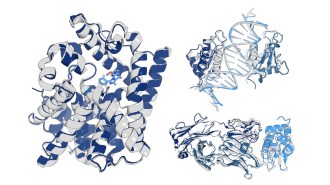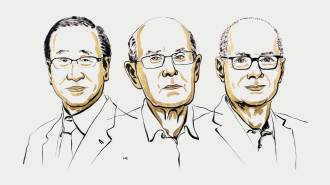Deciding Who’s First
Last night, chemistry offered up some tasty food for thought. It came in the form of a script reading of “Oxygen” – a play written by two renowned chemists (Carl Djerassi and Roald Hoffmann) and performed at the City University of New York as part of the inaugural World Science Festival. At once thought provoking and human, it raises the question of who to credit with a discovery.
In this instance, the debate is over who “found” oxygen. Was it the Swedish apothecary Carl Wilhelm Scheele, who performed the first experiments to separate it from air? Or the British Unitarian pastor Joseph Priestley, who was the first to formally publish data showing the same thing? Or French tax collector Antoine Laurent Lavoisier, whose was the last to do such experiments, but the first to understand their significance: that such experiments had not emitted some formerly hidden substance into air as materials burned, but instead withdrew something from air? Indeed, Lavoisier would eventually name the extracted gas, or “vital air,” oxygen – and his insights would go on to catalyze a revolution in chemistry.
The dispute moves back and forth between conversations among all of the protagonist chemists and their wives in 1777 and between members of the Nobel Prize’s chemistry committee in 2001. The play’s conceit: The latter panel has been charged with coming up with the first retroactive Nobel award to honor groundbreaking work done before the awards were created, a century earlier.
The 2000 play forces its audience to ruminate on what matters most in a discovery. Indeed, it asks us to decide when findings are sufficient to constitute a watershed discovery versus just the prelude – the stepping stones, if you will – to a paradigm shift.
It points to why there may be no easy answers. Moreover, it demonstrates how much one “discovery” builds on the incremental findings of others. Which steps in the process are crucial enough to laud, and how many of the contributors warrant sharing in the praise?
Based on the play, I’d vote for Lavoisier if the prize had to go to one individual. But better yet would be letting all three share it. The play ends, of course, minutes before the Nobel committee renders its decision. So we’re all left guessing how it members will ultimately weigh in.
But the timing for this performance forced me, at least, to ponder to what extent the Kavli awards committee faced similar challenges and engaged in similar bickering as it decided who should get its million-dollar awards two days ago. Maybe it took the “easy” way out by letting each award be shared. But as “Oxygen” pointed out, even choosing who should share may not be all that easy.






